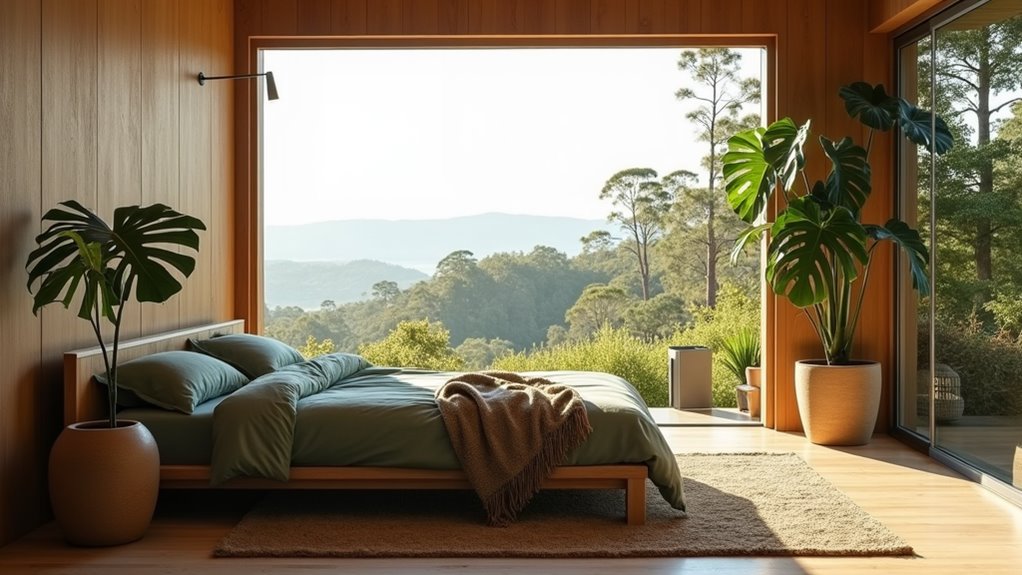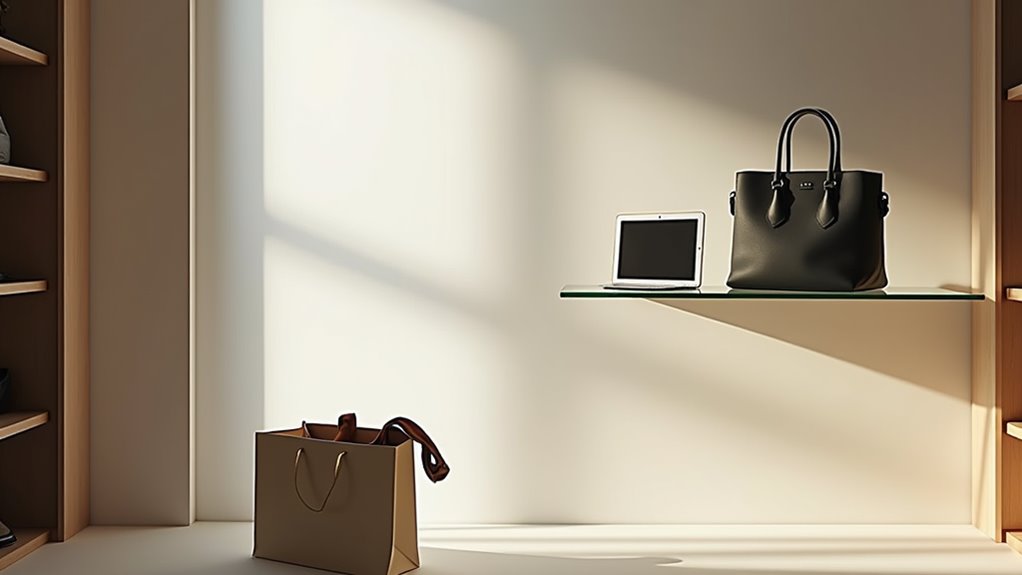You'll find today's luxury market has dramatically shifted from flashy logos and status symbols to meaningful experiences and sustainable choices. Conscious consumers now prioritize brands that demonstrate ethical production, environmental responsibility, and authentic storytelling. You're part of a movement that values craftsmanship, transparency, and social impact over traditional excess. Digital transformation has made luxury more accessible while emphasizing personalization and value-driven purchasing. Whether you're seeking sustainable materials, artisanal support, or unique experiences, the new definition of luxury aligns with your personal values and desire for positive impact. The evolution of conscious luxury holds even more inspiring changes ahead.
Key Takeaways
- Modern luxury prioritizes meaningful experiences and ethical production over traditional status symbols and flashy logos.
- Consumers increasingly choose brands that demonstrate environmental responsibility, transparent supply chains, and sustainable practices.
- Personal values and conscious decision-making now drive luxury purchases rather than solely focusing on premium materials.
- Authentic brand storytelling, ethical sourcing, and sustainable innovation create deeper emotional connections with luxury consumers.
- Digital transformation enables sustainable luxury consumption through virtual tools, blockchain verification, and personalized shopping experiences.
The New Face of Luxury

Authenticity redefines modern luxury, shifting away from flashy logos and status symbols toward meaningful, sustainable experiences.
You'll notice that today's luxury consumers seek products and services that align with their values, prioritizing craftsmanship, ethical production, and environmental responsibility.
As you explore this evolving landscape, you'll find that luxury isn't just about owning expensive items anymore. It's about accessing unique experiences, supporting artisanal traditions, and making mindful choices that reflect your commitment to sustainability.
You're part of a growing movement that values transparency in supply chains, fair labor practices, and eco-friendly materials. The new luxury emphasizes quality over quantity, longevity over trends, and purpose over prestige.
This transformation represents a deeper understanding of what truly matters in consumption.
Values Trump Traditional Status Symbols
While traditional status symbols once dominated consumer behavior, today's shoppers are increasingly guided by their personal values and ethical considerations.
You're now more likely to gain respect for driving an electric vehicle than a luxury sports car, or for wearing sustainable fashion rather than flashy designer labels.
Your purchasing decisions reflect your commitment to environmental stewardship, social justice, and community well-being.
Instead of seeking validation through expensive brands, you're choosing products that align with your values—whether that's supporting fair trade practices, reducing your carbon footprint, or promoting animal welfare.
This shift means you're redefining what's prestigious: it's no longer about showing off wealth, but about demonstrating consciousness and responsibility in your consumer choices.
Sustainable Practices Drive Premium Markets

The rise of value-driven consumerism has transformed premium markets, with sustainable practices now commanding top dollar.
You'll find that environmentally conscious production methods, ethical sourcing, and zero-waste initiatives aren't just buzzwords – they're driving forces behind premium pricing.
When you explore today's luxury market, you'll notice that brands are investing heavily in sustainable technologies and transparent supply chains.
These investments translate into higher production costs, but you're increasingly willing to pay more for products that align with your environmental values.
From fashion to food, companies that demonstrate genuine commitment to sustainability can charge premium prices while building customer loyalty.
You're part of a growing segment that sees luxury differently, valuing environmental stewardship over traditional markers of status.
Authenticity in Modern Luxury
Modern luxury brands are discovering that discerning consumers want more than just premium materials and craftsmanship – they're seeking genuine stories and real connections.
You'll find that today's luxury isn't just about displaying wealth; it's about aligning with your values and supporting brands that demonstrate transparency and purpose.
When you invest in authentic luxury goods, you're buying into a brand's heritage, ethical practices, and commitment to sustainability.
You can spot genuine luxury brands by their willingness to share their production processes, sourcing methods, and company values. They'll often highlight their artisans' expertise, showcase their sustainable initiatives, and maintain open dialogue with their community.
This authenticity creates a deeper emotional connection that goes beyond the mere ownership of premium products.
Digital Transformation of Luxury

The future of luxury shopping now resides in your smartphone, where you'll find virtual try-on features that let you sample high-end items before making a purchase.
You can verify the authenticity of luxury goods through blockchain systems that track each item's journey from creation to your closet.
AI-powered personal shopping assistants learn your preferences to curate exclusive selections tailored to your taste and lifestyle.
Virtual Try-On Innovation
Digital transformation has revolutionized how luxury brands let consumers experience their products, with virtual try-on technology leading this innovative shift.
You'll now find augmented reality (AR) tools that let you visualize how jewelry, watches, and accessories look on your body before making a purchase.
These virtual try-on solutions use sophisticated AI and computer vision to map products accurately to your features. You can test different colors, styles, and sizes from your smartphone or computer, making informed decisions without visiting physical stores.
Brands like Gucci, Cartier, and Louis Vuitton have integrated these technologies into their digital platforms, offering you a seamless way to experiment with their collections.
The technology's precision has improved so much that it's becoming a trusted tool for luxury shopping decisions.
Blockchain Authentication Systems
Beyond virtual try-ons, blockchain technology now safeguards luxury purchases through sophisticated authentication systems.
When you're buying high-end items, you can trace their entire journey from production to purchase, ensuring authenticity at every step. Each product receives a unique digital fingerprint that's impossible to replicate or tamper with.
You'll find that luxury brands are embedding NFC chips and QR codes into their products, linking them to blockchain records that verify their origin, materials, and ownership history.
This technology lets you instantly authenticate your purchases and protect yourself from counterfeits.
As a conscious consumer, you're not just buying a luxury item – you're investing in a fully traceable asset with a transparent supply chain that confirms its ethical production and genuine status.
AI-Powered Personal Shopping
As luxury retail evolves, AI-powered personal shopping assistants now curate tailored recommendations based on your style preferences, purchase history, and lifestyle needs.
These sophisticated algorithms learn from your interactions, creating a highly personalized shopping experience that saves you time and helps you discover products that align with your tastes.
You'll find that AI shopping assistants can analyze thousands of products instantly, considering factors like fabric quality, sustainability credentials, and brand reputation.
They'll alert you to new collections from your favorite designers, predict upcoming trends that match your aesthetic, and even suggest complementary pieces for your existing wardrobe.
Through advanced visual recognition and natural language processing, these AI tools can understand your specific requests and provide real-time styling advice, making luxury shopping more efficient and personalized than ever before.
Future of Mindful Consumption
You'll notice a rising trend in digital minimalism as consumers seek meaningful experiences over material possessions in the luxury sector.
Your purchasing decisions are increasingly influenced by a desire to reduce digital clutter and embrace more intentional consumption habits.
This shift towards mindful consumption is reshaping sustainable luxury, as you're now prioritizing products that align with both environmental consciousness and digital well-being.
Digital Minimalism Movement
The digital minimalism movement represents a growing pushback against excessive screen time and digital clutter.
You'll find more people embracing intentional technology use, deleting unnecessary apps, and limiting social media engagement to reclaim their time and mental space.
You can start your digital minimalism journey by conducting a digital declutter: unsubscribe from unnecessary email lists, organize your files, and remove unused apps from your devices.
Focus on keeping only the digital tools that add genuine value to your life and work.
The movement isn't about completely rejecting technology – it's about creating healthier boundaries.
You'll discover that by simplifying your digital life, you're better equipped to maintain focus, reduce anxiety, and engage more meaningfully with the world around you.
Sustainable Luxury Evolution
While traditional luxury once meant excess and exclusivity, sustainable luxury has emerged as a transformative force in high-end consumption.
You'll find luxury brands increasingly focusing on ethical sourcing, circular economy principles, and transparent supply chains.
Today's conscious luxury consumers aren't just buying products; they're investing in values.
You're now part of a movement that demands craftsmanship that lasts generations, materials that respect the environment, and production methods that honor human dignity.
Whether you're choosing a timepiece made from recycled metals or a handbag crafted from innovative vegan leather, you're participating in luxury's evolution.
This shift means you can align your desire for premium goods with your environmental values.
The future of luxury isn't about showing off wealth—it's about showcasing wisdom in your consumption choices.
Frequently Asked Questions
How Do Luxury Brands Maintain Exclusivity While Becoming More Environmentally Conscious?
You'll find luxury brands balancing exclusivity and sustainability through limited-edition eco-collections, innovative recycled materials, and transparent supply chains.
They're creating unique pieces with sustainable fabrics, offering repair services, and implementing buy-back programs.
What Role Does Ethical Sourcing Play in Determining Luxury Product Prices?
Like a precious gem's value rises with its pristine origins, ethical sourcing significantly impacts luxury product prices.
You'll notice that responsibly sourced materials often cost 20-40% more than conventional alternatives.
When you factor in fair labor practices, sustainable farming methods, and traceable supply chains, these costs add up.
You're not just paying for the product itself, but for the entire ethical journey from source to store.
Can Mass-Market Brands Successfully Transition Into the Conscious Luxury Segment?
Yes, you'll find that mass-market brands can transition into conscious luxury, but it's a complex process requiring significant changes.
You'll need to focus on authenticity, quality improvements, and supply chain transformation. It won't happen overnight – you're looking at a 3-5 year journey to build credibility.
Your success depends on maintaining transparency and proving genuine commitment to sustainability while gradually elevating your brand positioning.
How Are Traditional Craftsmen Adapting to Changing Luxury Consumer Preferences?
You'll find traditional craftsmen embracing digital platforms to showcase their work while maintaining time-honored techniques.
They're adapting by incorporating sustainable materials and transparent production processes, telling their authentic stories through social media.
You're seeing them collaborate with contemporary designers, creating limited editions that blend heritage with modern aesthetics.
They're also offering customization options and behind-the-scenes experiences to meet your desire for meaningful connections.
What Metrics Determine the Authenticity of a Luxury Brand's Sustainability Claims?
You'll find authenticity in certifications, supply chain transparency, and measurable impact.
Third-party audits from organizations like B Corp or Fair Trade verify environmental claims, while blockchain technology tracks material sourcing.
Look for detailed sustainability reports with specific metrics on water usage, carbon emissions, and waste reduction.
Social impact measurements, including fair labor practices and community investment programs, further validate a brand's genuine commitment to sustainability.
Conclusion
You're witnessing a seismic shift in luxury consumption, where 73% of millennials now prioritize experiences over material goods. As you embrace conscious consumerism, you'll find that true luxury isn't about flaunting logos – it's about making intentional choices that align with your values. Whether you're investing in sustainable fashion or seeking authentic craftsmanship, you're part of redefining luxury for a more mindful future.

Leave a Reply